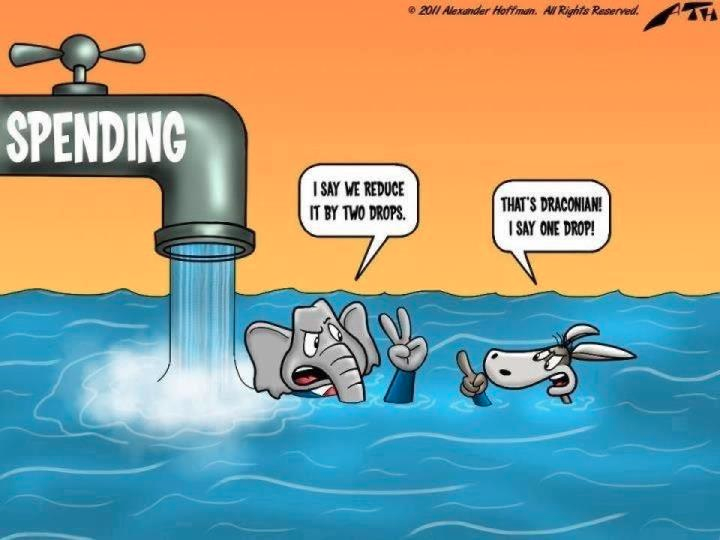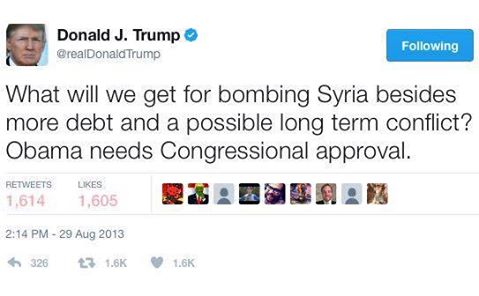|
Both big-ticket news items out of the Trump administration today remain largely speculative in many ways, so it's too early to draw firm conclusions about them. That said, based on what I heard today, I want to offer a few points for consideration.
TAX CUTS: It is no secret that our corporate tax code is grossly uncompetitive. It is among the most expensive on the entire planet and is structured such that it discourages investing, hiring, and other key facets of a healthy economy. It discourages entrepreneurialism, encourages companies to move their headquarters to other countries, and creates an incentive for American corporations to leave large amounts of their cash overseas--cash that could be brought home and put to work in our own economy. This is what happens when you have a very archaic and outdated corporate tax system. When I say "outdated," I mean it literally: the U.S. is one of the last remaining developed countries with a world-wide tax system (meaning that money corporations earn around the world, not just the income they derive from the U.S., can be taxed here). Most of our peers got rid of world-wide tax systems decades ago. I agree with Trump: 15% is a reasonable corporate income tax rate. (There are strong arguments to be made for its elimination entirely, but that's for a post another day.) This is the hallmark of his plan, and I like it. I need to point out two grave concerns I have though. (1) It isn't clear that his plan will dramatically simplify the corporate tax code. Rates do need to come down, but that's far from the only problem. The code's complexity creates an additional tax in and of itself because complying with it is such an expensive legal and accounting endeavor. Any major reform must include simplifying and streamlining the tax code. (2) Trump said that he doesn't care about revenue, and this plan seems to bear that out. This is a plan that, when combined with Trump's high levels of proposed spending, would add mightily to our national debt. Any tax and spending plans Republicans pass through Congress MUST seek to reign in our exploding national debt. You cannot increase spending while cutting tax rates and narrowing the tax base. The base should be broadened, the rates lowered, and the spending brought to heel. There is a myth floating around the White House that cutting the corporate tax rate to 15% will lead to enough economic growth to offset tax revenue losses at current rates. That is not true. Cutting the corporate tax rate will lead to higher growth, but it will not lead to enough growth to stem the rising tide of national debt. (Corporate tax rates are but one of many headwinds our economy faces.) Any tax plan must be, at a minimum, revenue neutral and passed in conjunction with LOWER spending plans. Otherwise, you're essentially mortgaging your future for a little short-term relief. Additional government debt can quickly crowd out additional private investment, after all. NAFTA: Rumors are circulating that Trump may be planning to sign an executive order expressing our intent to leave NAFTA. This would be an error of historic proportions. It is a good idea to occasionally revisit old agreements. Our economy and the world in general are very different places than they were when NAFTA was negotiated. We should never consider economic frameworks to be entirely permanent. Thus, re-opening negotiations could be a very good idea. Re-negotiating and leaving are very, very different outcomes though. If we left NAFTA, three realities are absolutely certain to set in: (1) a small number of jobs would come back to the U.S.--far too few for most people even to know someone who held one of those new jobs; (2) far, far more jobs would simply be automated--no one would hold them; and (3) the prices that ALL Americans pay for many goods and some services would increase sharply. It wouldn't end there though. This would be catastrophic for Mexico and Canada and near-catastrophic for the U.S. Stock markets would be hammered. GDP growth would slow--possibly even reverse (which means lower standards of living for many people). Anyone who has a 401(k), an IRA, or simply invests a little in the stock market to plan for retirement would find his retirement calculus suddenly looking less rosy. The world is a different place today. Taking another look at NAFTA's terms is a good idea. As I said though, the world is a different place today, and whereas whether to join NAFTA was a good question in the 90's, two decades later, whether to leave it shouldn't even be up for discussion. Follow libertyLOL on your favorite social media sites:FacebookYoutube Tumblr Pintrest Countable: Government Made Simple Steemit blog on a blockchain Patreon Gab.ai libertyLOL's Liberty Blog RSS Feed We also run a couple twitterbots which provide great quotes and book suggestions: Murray Rothbard Suggests Tom Woods Suggests Jason Stapleton Suggests Progressive Contradictions MORE FROM LIBERTYLOL:
0 Comments
.
Great article from a list I subscribe to over at Norada. Biggest failure I see in my clients is that they have no desire to better themselves or build Human Capital and expand their skillset. READ! Bottom line is that in 5-10 years, you will be the same person you are today with the exception of the books you read and the new people you meet. Try to be better 5-10 years from now. Keep growing. Read. Research shows that 88% of wealthy people devote at least 30 minutes a day to reading. If it works for them, it could work for you. Below, we’ve rounded up 12 of our favorite books, from personal finance classics to new releases. Here’s to a prosperous year! 1. “Think and Grow Rich” by Napoleon Hill Journalist Napoleon Hill researched more than 500 self-made millionaires, including Andrew Carnegie, Henry Ford, and Charles M. Schwab, before releasing this 1937 best-seller. Hill’s timeless personal fiance classic will help you understand that getting rich is more about mentality above anything else. In fact, he barely mentions the words “money,” “wealth,” or “finances.” Rather, he explains the psychological barriers that hold many people back from building fortunes — and teaches you how to start thinking your way to success. 2. “Business Adventures” by John Brooks Rich people tend to believe starting a business is the fastest way to make money. This read, endorsed by self-made billionaires Bill Gates and Warren Buffett, will teach you just how to do that … but not the way a conventional business book does. “Unlike a lot of today’s business writers, Brooks didn’t boil his work down into pat how-to lessons or simplistic explanations for success (How many times have you read that some company is taking off because they give their employees free lunch?)” Gates explains. “You won’t find any listicles in his work. Brooks wrote long articles that frame an issue, explore it in depth, introduce a few compelling characters, and show how things went for them.” Don’t let the 1969 publication date throw you off. While a lot has changed in the business world since the 1960’s, the fundamentals of building a strong business have not, Gates writes, adding, “Brooks’s deeper insights about business are just as relevant today as they were back then.” 3. “The Little Book of Common Sense Investing” by John C. Bogle One of the most effective ways to build wealth is to invest. At least, if you do it correctly. Bogle, founder of the Vanguard Group and creator of the world’s first index fund, details the simplest and most efficient investment strategy: Investing in low-cost index funds. Legendary investor Warren Buffett also says that every investor, large and small, should pick up a copy. 4. “The Essays of Warren Buffett” by Warren Buffett If a blurb by Buffett doesn’t entice you, get directly inside the billionaire’s head with this collection of letters and notes written by the “Oracle of Omaha.” The 700+ page book offers a clearer picture of Buffett’s philosophies on business, investing, and life. 5. “Tools of Titans” by Tim Ferriss What does it take to be a billionaire? Best-selling author Tim Ferriss’ latest book explores the daily routines and habits of celebrities, professional athletes, hedge fund managers and others. Ferriss went straight to the sources and interviewed more than 200 world-class performers. For a sneak peak, check out one, peculiar habit that the wealthiest, most successful people share. 6. “The Richest Man in Babylon” by George S. Clason Nearly a century ago, Clason revealed the “secret” to getting rich in his 1926 personal finance classic. It turns out that the “secret” isn’t much of one. All it takes to get rich is mastering a few simple concepts, such as paying yourself first and living within your means, which Clason preaches via a collection of entertaining parables. 7. “Rich Dad Poor Dad” by Robert Kiyosaki Kiyosaki shatters the myth that you need to earn a lot of money to get rich in this best-seller. By telling the story of two dads — his own, and the father of his best friend — he explains how to build wealth even with a small salary. Additionally, Kiyosaki challenges the popular belief that your house is an asset, details the differences between how rich people and average people choose to get paid, and emphasizes the critical difference between an asset and a liability. 8. “The Automatic Millionaire” by David Bach Self-made millionaire and financial advisor David Bach exposes a handful of money misconceptions in his easy-to-read best-seller. You don’t need a budget, you don’t need to make a lot of money, and you don’t even need willpower to accumulate a fortune, he writes. Research shows that 88% of wealthy people devote at least 30 minutes a day to reading. If it works for them, it could work for you. Below, we’ve rounded up 12 of our favorite books, from personal finance classic to new releases, to work your way through over the next 12 months. Here’s to a prosperous 2017! 9. “How Rich People Think” by Steve Siebold When Steve Siebold started interviewing hundreds of millionaires and billionaires, he was “completely broke and searching for answers about success I wasn’t finding in the classroom,” he writes. “What I discovered was, to get rich, I had to learn to think like a rich person. … Once I changed my thinking, the money started to flow.” Anyone has the opportunity to build wealth, he stresses in “How Rich People Think,” and it all starts with changing your mindset. For a sneak peak, check out the number one way rich people view the world differently than the average person. 10. “Be Obsessed or Be Average” by Grant Cardone As Siebold says, to get rich, you have to learn from those who have already done it. Self-made millionaire Grant Cardone knows a thing or two about managing money: The entrepreneur has built five companies and a multi-million dollar fortune. In the best-selling author’s latest book, he emphasizes that if you want real success, you have to be hungry, hyper-focused, even obsessed. While Cardone offers some contrarian advice — he discourages investing in a 401(k) plan and buying a home — his wealth-building strategies helped him go from broke at 25 to earning his first million by age 30. 11. “The Power of Broke” by Daymond John “Shark Tank” investor and entrepreneur Daymond John turned $40 worth of fabric into a $6 billion brand, FUBU. Along the way, he’s been rejected a lot and has lost a lot. Being broke, however, offers at least one major advantage: It sparks creativity and out-of-the-box solutions, he explains in “The Power of Broke.” Don’t write off your chances of wealth and success if your bank account is low, he suggests. Use it to your advantage. 12. “You Can Negotiate Anything” by Herb Cohen If you want to earn more in 2017, a simple yet often overlooked strategy is to negotiate your salary. If you’re nervous about approaching your boss to ask for a raise, try Cohen’s best-seller. It will help you get what you want, and what you deserve. For more great suggestions follow me on Twitter at Jason Stapleton Suggests and Tom Woods Suggests. You can also get two FREE Audiobooks by signing up with Audible on the link below: Follow libertyLOL on your favorite social media sites:FacebookYoutube Tumblr Pintrest Countable: Government Made Simple Steemit blog on a blockchain Patreon Gab.ai libertyLOL's Liberty Blog RSS Feed We also run a couple twitterbots which provide great quotes and book suggestions: Murray Rothbard Suggests Tom Woods Suggests Jason Stapleton Suggests Progressive Contradictions MORE FROM LIBERTYLOL:
I’m tempted to say that statism is sort of like a cult. Proponents of socialism and other big-government ideologies have a dogmatic zeal that blinds them to reality. For instance, no nation has ever become rich with big government. But that doesn’t stop leftists from advocating in favor of higher taxes and more coercive redistribution.
So long as they don’t burn me at the stake for my heretical views, I guess I won’t get too agitated by their bizarre fetish for statism. But I will periodically mock them. And that’s the purpose of today’s column. We’ll start with this nice comparison between a capitalist grocery store and a socialist grocery store. I have no idea, by the way, if the lower image actually is a supermarket in a socialist country, but let’s not forget that a real-world version of this comparison is one of the reasons there’s no longer an Evil Empire.
But the bad news about socialism is not limited to economic deprivation for the masses. The system also leads in many cases to totalitarianism (see this article by Marian Tupy, for example). Venezuela is a particularly poignant example. Once the richest nation in Latin America, it now is an economic laggard and also is a cesspool of oppression. Which makes this set of images from Reddit‘s libertarian page both funny and sad.
As you might expect, Milton Friedman had some very pointed observations on this topic. The really good part starts shortly before 2:00. He explains very clearly that socialism is based on force and coercion. I’ve saved the best for last. The PotL sent me this collection of risky temptations and it perfectly captures the attitude of many statists. No matter how many times socialism has failed, they never learn the appropriate lesson. It just hasn’t been tried by the right people, they tell us. Or been imposed in the right circumstances. So they want us to give it one more try, just like a person with no willpower will eat one more bite of chocolate.
Which is the same message you find here, here, and here. Incidentally, this analysis not only applies to socialism, as technically defined, but it also applies to redistributionism. Which is definitely more benign, but nonetheless produces bad results. The bottom line is that statism is a recipe for stagnation and free markets are a route to prosperity. Republished from International Liberty. 
Daniel J. MitchellDaniel J. Mitchell is a senior fellow at the Cato Institute who specializes in fiscal policy, particularly tax reform, international tax competition, and the economic burden of government spending. He also serves on the editorial board of the Cayman Financial Review. This article was originally published on FEE.org. Read the original article. Follow libertyLOL on your favorite social media sites:FacebookYoutube Tumblr Pintrest Countable: Government Made Simple Steemit blog on a blockchain Patreon Gab.ai libertyLOL's Liberty Blog RSS Feed We also run a couple twitterbots which provide great quotes and book suggestions: Murray Rothbard Suggests Tom Woods Suggests Jason Stapleton Suggests Progressive Contradictions MORE FROM LIBERTYLOL:
It may be the most comprehensive and broad collection of data about our governments that exists. It's non-partisan and, in something akin to a breath of fresh air, doesn't offer opinions or analysis--just data. There is data on the local, state, and federal levels of government. Do you want to know how much revenue the governments take in? How much they spend? It's there. Do you want to know the sources of government revenue and where it's all spent? He has that too. You can even look up numbers of police officers your government employs, crime rates, spending on various subsidies, and just about anything else you could ever want. It's all presented in a very user-friendly, clear interface as well. It should be fairly approachable be nearly everyone. Anyway, I'm providing this in case anyone wants to get a clean look at relevant data without layers of "interpretation and analysis" (i.e., bias) that so many Left- and Right-leaning websites display these days (under the guise of objectivity, of course). Caution though: If you're offended by facts, then you may want to stay away from this one. https://www.usafacts.org/ Follow libertyLOL on your favorite social media sites:FacebookYoutube Tumblr Pintrest Countable: Government Made Simple Steemit blog on a blockchain Patreon Gab.ai libertyLOL's Liberty Blog RSS Feed We also run a couple twitterbots which provide great quotes and book suggestions: Murray Rothbard Suggests Tom Woods Suggests Jason Stapleton Suggests Progressive Contradictions MORE FROM LIBERTYLOL:
Troy is throwing a bullshit flag. Anyone remember when you used to have a nozzle on a gas can where you could simply open the cap and pour gas out of it? If you were in a hurry you could pop out the small vent tab in the can to allow air in and make it pour faster. Now, we have these shitty, plastic twist-turn, extend-contract, contrapations that have inspired me to reach new heights of profanity while trying to fill my push mower. They are way worse than child proof medication bottles. Whats worse, they invariably leak gas everywhere. Three cans in five years, they all end up leaking within a few weeks. So, there I am cleaning gas off my hands, after spreading sawdust over yet another gas spill on my garage floor. I start to wonder who the fucks bright idea it was to fix something that wasn't broke? Wasn't a simple cap and hose good enough? I looked at the can and saw the words "EPA compliant." So I got on the web and learned more about evaporation loss with low boiling point liquids, how the old system vented gas to air, and how this evaporative loss was a legitimate problem. I learned how stopping it can save me gas and therefore save me money. Then I went back out to the garage and looked at the gas spill. I stood there and looked at the epa label telling me how its saving gas, then I looked back at the gas spill. I stood there for a solid two minutes appreciating the irony. I went in and poured myself a glass of wine to savor the moment. Its bullshit. Its not working. Three in five years might be a small sample group, but I'm guessing everyone who actually has to pour gas knows they are not working. However, nothing will be done about it. Say something negative, (or positive) about the EPA and watch everyone obsessed with politics turn on you like rabid dogs. I went and bought a funnel. Unfortunately, its an EPA-approved funnel with several moving parts, so it will probably leak by the end of the month too. I came home from the store with the EPA funnel and had a second glass of wine. I listened to some Delibes, "The Flower duet" while I contemplated and enjoyed my afternoon. I get why Nero fiddled while Rome burned. I really get it. The thing about it is this: Rome got exactly what it deserved. Why should he have tried to stop it? 01daa3717768a21a Follow libertyLOL on your favorite social media sites:FacebookYoutube Tumblr Pintrest Countable: Government Made Simple Steemit blog on a blockchain Patreon Gab.ai libertyLOL's Liberty Blog RSS Feed We also run a couple twitterbots which provide great quotes and book suggestions: Murray Rothbard Suggests Tom Woods Suggests Jason Stapleton Suggests Progressive Contradictions MORE FROM LIBERTYLOL:
"Kings had always been involving and impoverishing their peoples in wars, pretending generally, if not always, that the good of the people was their object. This, our Convention understood to be the most oppressive of all Kingly oppressions; and they resolved to so frame the Constitution that no one man should hold the power of bringing this oppression upon us." -Abraham Lincoln
Do you hear that? It's the sound of war drums beating throughout the United States. The steady beat coming from the news outlets has led to more discussion on social media. Your friends and family are becoming useful idiots by parroting corporate media claims and politician's talking points . They do this all while assuring you and others that they have the moral high ground. We're going to war 'for the children', 'because no one should attack their own people with gas' and because 'we have to do something!'.
The virtue signaling outweighs any call for truth. Syrian children are being openly exploited in an effort to get everyone on board with war, without verifying any details. Go to war first, then ask questions. The first casualty of war is the Truth. -Representative Thomas Massie Any good student of history knows that there will ALWAYS be an emotional event necessary to stir up public buy-in for war. Many times later, as we will see, these events are determined to be frauds perpetuated by those who wish to capitalize on perpetual war. Let’s analyze this list in reverse chronological order. You might notice a major conflict not listed. We'll discuss it's absence at the bottom. Syria (now)
On the eve of Peace Treaty talks to discuss the rebuilding of Syria, the quantity of infrastructure money Syria would receive, and after a prolonged campaign which saw the successful repelling of his enemies, Bashar Al Assad decided this was the time to gas his own people. This move would undoubtedly remove any support he might have had and turn even his allies against him. Read that again. How much sense does that make? No savvy politician would order such an attack unless it was a last resort when facing an existential threat. Today, an MIT leading weapons academic claimed that the nerve agent attack in Syria was staged, raising questions about who might be responsible. "His analysis of the shell suggests that it could not have been dropped from an airplane as the damage of the casing is inconsistent from an aerial explosion. Instead, Postol said it was more likely that an explosive charge was laid upon the shell containing sarin, before being detonated." Jason Stapleton also discusses why it makes little sense for Assad to resort to gas attacks at this time: I’ll leave the discussion surrounding the validity of the sarin gas attack alone. Speculation that the event was faked came immediately. Some was thought-provoking while other claims seemingly grasped for straws. Photos disturbingly revealed medical responders handling victims bare-handed (it takes about 2-3 seconds of exposure to absorb through the skin with immediate bowel releasing effects). Doubts also surfaced as Dr Shajul Islam , a doctor in charge of receiving victims, spent a fantastic amount of time tweeting about his overrun hospital and its inability to handle so many victims. He entertained others in twitter debates and requested people who didn’t believe him to ‘call him’ when many believe he should have been overrun with patients. History has a way of determining the validity of these emotional triggers to war. In the meantime, the importance of confirming reports before spending American blood and coin in faraway lands cannot be overstated. These trends which mold public opinion highlight the importance of discerning truth/fiction when the drum beats of war begin. For instance, this 7-year old Syrian child runs a Twitter account, speaks perfect English, is verified somehow, and is an absolute media darling receiving constant retweets by CNN and other large networks. It’s almost as if the media isn’t even trying to hide their sculpting of public pro-war opinion. Casualties in Syria to date: 22 Americans Trump was correct when he said we should leave these people alone and let them sort it out on their own. Syria (first attempt, 2013)
In 2013 the war drums beat for U.S. intervention into Syria and politicians received a resounding ‘No’ from their constituencies. War-weary citizens weren’t making the “Syrian civil war threatens American interests” connection. Polls saw a substantial shift toward Pro-War sentiment, however, after a particularly gruesome beheading video Americans James Foley and Steven Sotloff on 19 August and 2 September respectively. While many online conspiracy theorists were ridiculed when they questioned the authenticity of the video, they were ultimately validated when it was revealed that the video was likely staged with green screens, camera trickery and slick post-production techniques. At the direction of U.S. President Barack Obama, the CIA was put in charge of operations worth about $1 billion annually to arm anti-government forces in Syria. It failed terrifically and is largely the result of the current situation today. Headlines such as US-Backed Syrian ‘Moderates’ Behead 12-Year-Old did not demand as much attention for CNN airtime. Children will always be used as props for war because nothing else tugs on heart strings more. This photo of Omran Daqneesh went viral as 'the iconic image of war-torn Syria'. He and his sister have really been down on their luck. It seems they've been used over and over in multiple war scenes across the country, sometimes even wearing the same war-torn clothes! Videos can be found of photographers setting up this shot while Omran wipes at his bloody face painlessly. Americans avoided the hefty coordinated push for war by politicians such as Lindsay Graham and John McCain (both highly funded by defense industries that have never met a war they didn’t support) as well as media organizations doing their part to fan the flames of war. Attempted war with Syria was thwarted although persistent bombings and limited military operations have continued ever since. Casualties in Syria to date: 22 Americans North Korea (now)
The drum beats for war started even before North Korea launched a KN-15 medium-range ballistic missile approximately 40 miles into the Sea of Japan. It started even before Secretary of State, Rex Tillerson awkwardly said "North Korea launched yet another intermediate range ballistic missile. The United States has spoken enough about North Korea. We have no further comment." Some took that to mean action will follow, not just more rhetoric. Possible attempts to begin shaping public Anti-North Korean sentiment can be seen as far back as 2014, though it’s seen the rounds on social media and cable reporting more and more the past 6 months. Listening to this testimony made me immediately think of the fake- Nariyah testimony (Iraqi soldiers throwing babies from incubators, discussed below) which helped shape support for an Iraqi invasion in 1991. No one is claiming North Korea is a paradise. I’m also not claiming this to be fake; merely that it doesn’t pass the smell test. Casualties in North Korea to date: N/A Afghanistan (2003)
|
Search the
libertyLOL Archives: Archives
December 2020
Search and Shop on Amazon.com!
Tom Wood's Liberty Classroom"Get the equivalent of a Ph.D. in libertarian thought and free-market economics online for just 24 cents a day...."
At Liberty Classroom, you can learn real U.S. history, Western civilization, and free-market economics from professors you can trust. Short on time? No problem. You can learn in your car. Find out more! |



 They are equally capable of rationalizing that economic misery in places such as
They are equally capable of rationalizing that economic misery in places such as 






































